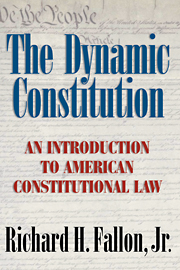Book contents
- Frontmatter
- Contents
- Preface
- Prologue: Bush v. Gore
- Introduction: The Dynamic Constitution
- Part I Individual Rights Under the Constitution
- Part II The Constitutional Separation of Powers
- Part III Further Issues of Constitutional Structure and Individual Rights
- 10 Elections, Political Democracy, and the Constitution
- 11 Structural Limits on State Power and Resulting Individual Rights
- 12 The Constitution in War and Emergency
- 13 The Reach of the Constitution and Congress's Enforcement Power
- 14 Conclusion
- Appendix: The Constitution of the United States
- Notes
- Index
13 - The Reach of the Constitution and Congress's Enforcement Power
Published online by Cambridge University Press: 25 July 2009
- Frontmatter
- Contents
- Preface
- Prologue: Bush v. Gore
- Introduction: The Dynamic Constitution
- Part I Individual Rights Under the Constitution
- Part II The Constitutional Separation of Powers
- Part III Further Issues of Constitutional Structure and Individual Rights
- 10 Elections, Political Democracy, and the Constitution
- 11 Structural Limits on State Power and Resulting Individual Rights
- 12 The Constitution in War and Emergency
- 13 The Reach of the Constitution and Congress's Enforcement Power
- 14 Conclusion
- Appendix: The Constitution of the United States
- Notes
- Index
Summary
[C]ivil rights, such as are guaranteed by the constitution against state aggression, cannot be impaired by the wrongful acts of individuals, unsupported by State authority.
– The Civil Rights Cases (1883)Congress does not enforce a constitutional right by changing what the right is. It has been given the power “to enforce,” not the power to determine what constitutes a constitutional violation.
– City of Boerne v. Flores (1997)This chapter deals with three separate but related issues concerning the nature and reach of constitutional rights. One involves the applicability of the Constitution: Against whom does the Constitution create rights? Another has to do with the character of the rights that the Constitution creates. Nearly all are rights to be free from one or another kind of hostile governmental action. Few are rights to affirmative governmental assistance. Why? The final topic involves the scope of Congress's power to “enforce” constitutional guarantees. In enforcing the Constitution, to what extent, if any, does Congress share in the power to determine the Constitution's meaning?
State Action Doctrine
A few years ago, a major league baseball pitcher named John Rocker gave a magazine interview in which he denounced New York City, the New York City subways, and gays. He mocked foreigners and referred to a Latino teammate as “a fat monkey.” Rocker's comments disturbed a lot of people, including officials of Major League Baseball, a private, for-profit organization of private, for-profit baseball teams.
- Type
- Chapter
- Information
- The Dynamic ConstitutionAn Introduction to American Constitutional Law, pp. 254 - 268Publisher: Cambridge University PressPrint publication year: 2004



